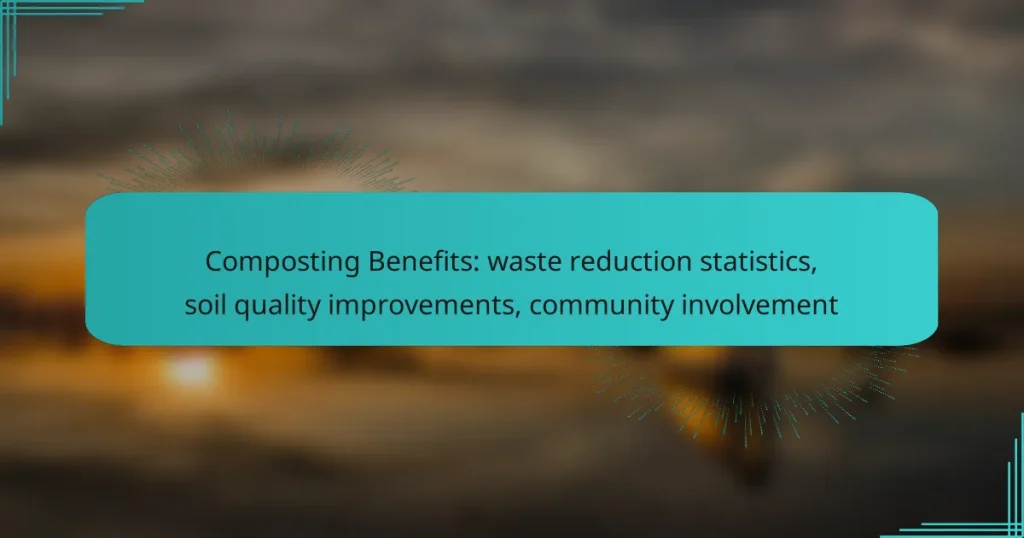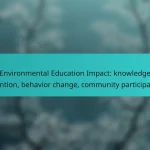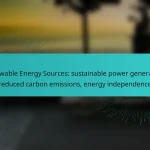Composting offers a multitude of benefits, significantly reducing waste by diverting organic materials from landfills while enhancing soil quality. This sustainable practice not only enriches soil with essential nutrients but also fosters community involvement, encouraging collaboration and shared environmental goals. By adopting composting, individuals and communities can contribute to healthier ecosystems and more productive gardens.

How does composting reduce waste in Australia?
Composting significantly reduces waste in Australia by diverting organic materials from landfills. This process not only minimizes the amount of waste sent to disposal sites but also enhances soil quality and promotes sustainable practices within communities.
Reduces landfill waste by 30%
Composting can reduce landfill waste by approximately 30% by transforming organic materials like food scraps and yard waste into valuable compost. This shift helps alleviate pressure on landfill sites, which are often nearing capacity in urban areas.
In Australia, local councils are increasingly implementing composting programs to encourage residents to participate. By providing bins and educational resources, they facilitate the diversion of organic waste from landfills, making it easier for households to contribute.
Decreases greenhouse gas emissions
Composting decreases greenhouse gas emissions by preventing organic waste from decomposing anaerobically in landfills, which produces methane—a potent greenhouse gas. By composting, these emissions can be significantly reduced, contributing to a healthier environment.
In addition to reducing methane, composting enriches soil, which can improve carbon sequestration. This means that healthy soils can store more carbon, further mitigating climate change impacts.
Promotes recycling of organic materials
Composting promotes the recycling of organic materials by turning waste into a resource. This process encourages individuals and businesses to rethink how they handle food scraps and yard waste, fostering a culture of sustainability.
Community composting initiatives often include workshops and events that educate participants on how to compost effectively. These programs not only teach practical skills but also build community ties as residents work together towards common environmental goals.
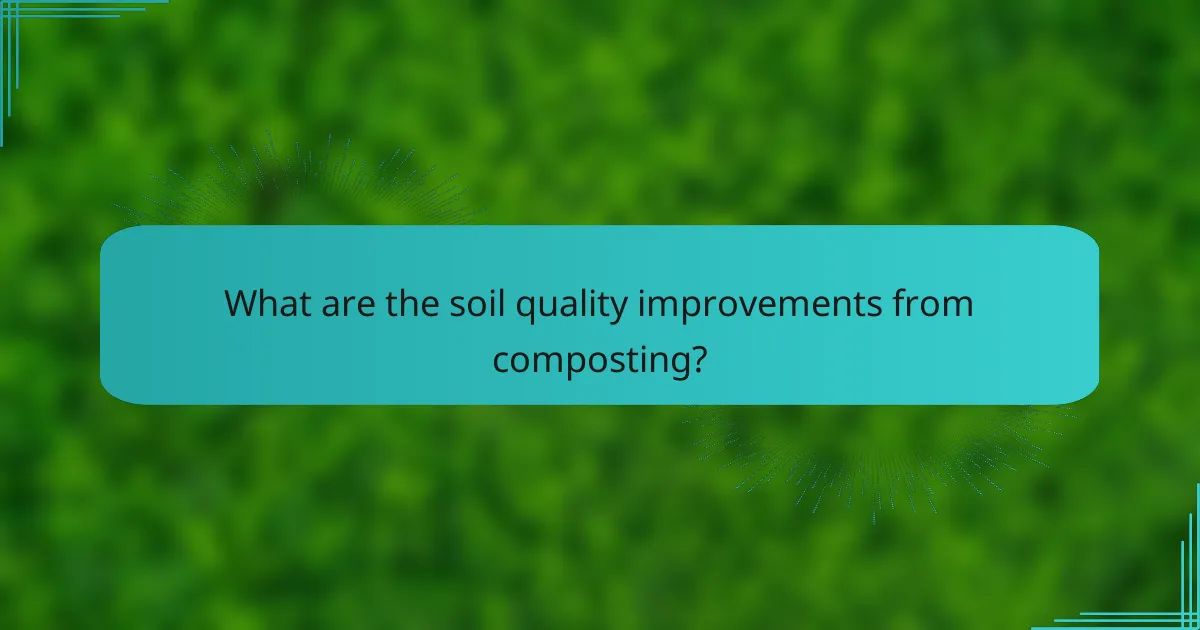
What are the soil quality improvements from composting?
Composting significantly enhances soil quality by enriching it with nutrients, improving its structure, and increasing its ability to retain moisture. These benefits lead to healthier plants and more productive gardens, making composting a valuable practice for both home gardeners and agricultural producers.
Enhances soil fertility
Composting boosts soil fertility by adding organic matter that supplies essential nutrients like nitrogen, phosphorus, and potassium. These nutrients are crucial for plant growth and can lead to higher crop yields. For example, compost can increase nutrient availability by up to 30%, depending on the initial soil quality.
Using compost as a natural fertilizer reduces the need for chemical fertilizers, which can be harmful to the environment. Regular application of compost can create a sustainable cycle of nutrient replenishment in the soil.
Improves soil structure
Composting improves soil structure by promoting the formation of aggregates, which are clusters of soil particles. These aggregates enhance aeration and root penetration, allowing plants to access water and nutrients more effectively. Healthy soil structure can reduce compaction and erosion, leading to a more resilient ecosystem.
Incorporating compost into the soil can transform heavy clay soils into more workable, loamy textures, making them easier to cultivate. This change can significantly benefit urban gardeners dealing with poor soil conditions.
Increases moisture retention
Composting increases moisture retention in soil by enhancing its ability to hold water. Organic matter from compost acts like a sponge, absorbing and retaining moisture, which is particularly beneficial during dry periods. This can reduce the frequency of watering needed, saving time and resources.
For instance, adding compost to sandy soils can improve their water-holding capacity by several times, making them more productive. Gardeners should aim to mix compost into their soil at a ratio of about 25-30% to maximize these moisture retention benefits.

How does composting foster community involvement?
Composting fosters community involvement by bringing people together around shared environmental goals and sustainable practices. It encourages collaboration, education, and local engagement, creating a sense of community ownership over waste reduction and soil health.
Encourages local gardening initiatives
Composting supports local gardening initiatives by providing nutrient-rich soil amendments that enhance plant growth. Community gardens benefit from compost, which improves soil structure and fertility, leading to healthier plants and increased yields.
Many neighborhoods organize composting workshops that teach residents how to create and maintain their own compost systems, which in turn supports local gardening efforts. These initiatives often lead to the establishment of more community gardens, promoting local food production.
Promotes educational workshops
Educational workshops on composting help residents understand the benefits of waste reduction and soil improvement. These sessions often cover topics such as composting techniques, types of compostable materials, and the environmental impact of composting.
Workshops can be hosted by local governments, non-profits, or community organizations, making them accessible to a wide audience. Participants learn practical skills that they can apply at home, fostering a culture of sustainability within the community.
Builds community composting programs
Community composting programs create centralized composting facilities where residents can drop off organic waste. These programs not only reduce landfill waste but also produce compost that can be used in local gardens and parks.
Successful community composting initiatives often involve partnerships between local governments and community groups, ensuring that the programs are well-supported and effectively promoted. Engaging residents in these programs cultivates a sense of responsibility and pride in local environmental stewardship.
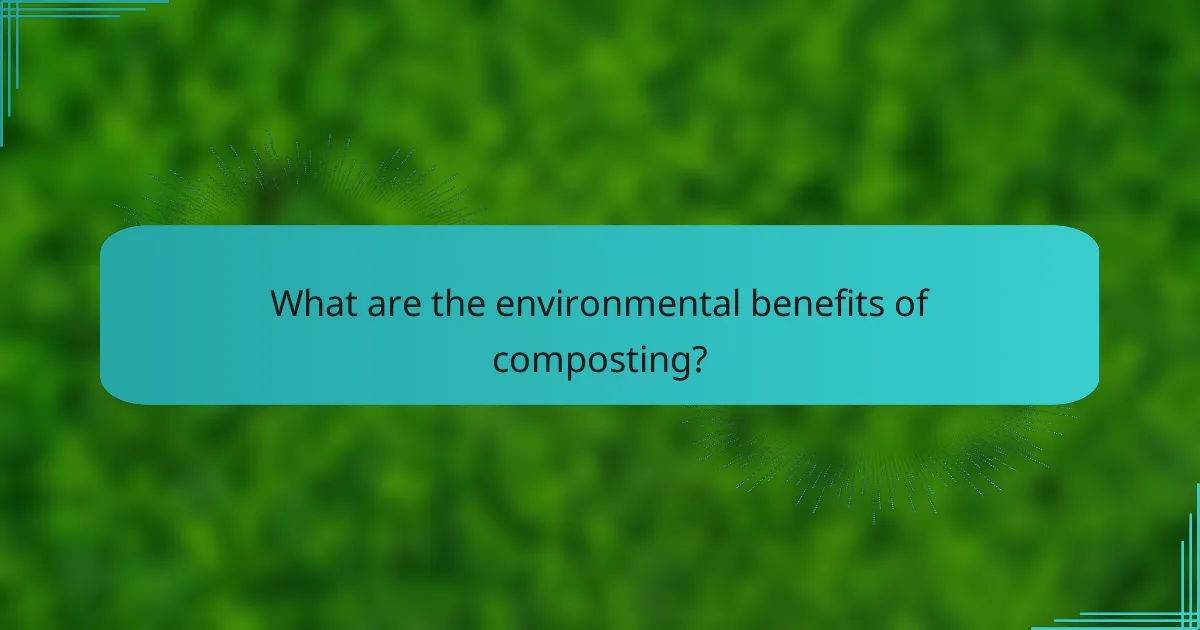
What are the environmental benefits of composting?
Composting offers significant environmental benefits, including waste reduction, improved soil quality, and enhanced community involvement. By converting organic waste into nutrient-rich compost, communities can reduce landfill contributions and promote healthier ecosystems.
Supports biodiversity
Composting supports biodiversity by creating a rich habitat for various organisms. Healthy compost enriches soil with essential nutrients, fostering a thriving ecosystem that includes beneficial microbes, insects, and plants.
For example, adding compost to gardens can attract pollinators and other wildlife, which are crucial for maintaining ecological balance. This diversity not only enhances plant growth but also contributes to a more resilient environment.
Reduces soil erosion
Composting helps reduce soil erosion by improving soil structure and increasing its ability to retain moisture. Well-aerated compost enhances soil aggregation, which protects against the forces of wind and water that can wash away topsoil.
In regions prone to heavy rainfall, incorporating compost into the soil can significantly decrease erosion rates. This practice is especially beneficial for agricultural lands, where maintaining soil health is vital for crop production.
Enhances carbon sequestration
Composting enhances carbon sequestration by storing carbon in the soil, which helps mitigate climate change. When organic matter decomposes in a compost pile, it transforms into stable carbon compounds that can remain in the soil for years.
By using compost in landscaping and agriculture, communities can effectively capture carbon dioxide from the atmosphere, contributing to a reduction in greenhouse gas levels. This process not only benefits the environment but also promotes sustainable land management practices.
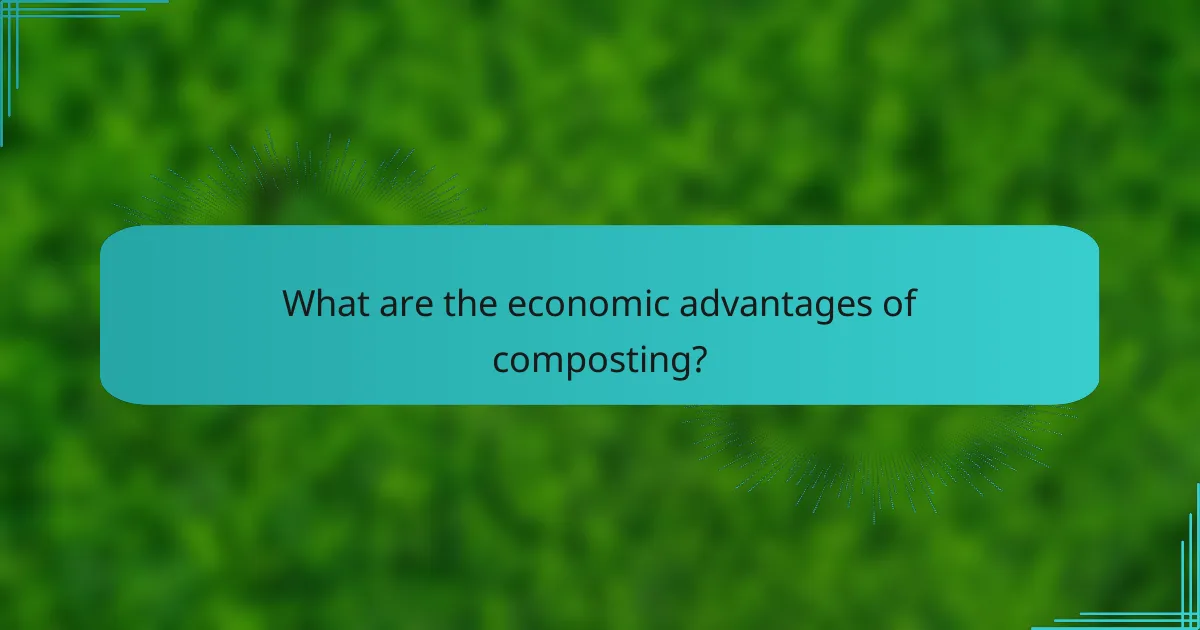
What are the economic advantages of composting?
Composting offers significant economic advantages by reducing waste management costs, creating job opportunities in green sectors, and increasing property values. These benefits contribute to a more sustainable economy while promoting environmental health.
Reduces waste management costs
Composting lowers waste management expenses by diverting organic materials from landfills, which can incur high disposal fees. Municipalities that implement composting programs often experience reduced landfill usage, leading to savings in transportation and tipping fees.
For example, communities that compost can save tens of thousands of dollars annually, depending on the volume of organic waste processed. Additionally, composting can extend the lifespan of existing landfills, further reducing long-term costs.
Creates job opportunities in green sectors
The composting industry generates jobs in various sectors, including waste management, agriculture, and environmental services. As more communities adopt composting initiatives, the demand for workers to manage compost facilities and educate the public increases.
Positions can range from facility operators to outreach coordinators, with salaries varying based on location and experience. Investing in composting infrastructure can lead to hundreds of new jobs in a region, contributing to local economic growth.
Increases property values
Properties in areas with active composting programs often see an increase in value due to enhanced community aesthetics and environmental benefits. Well-maintained green spaces and gardens enriched with compost can attract potential buyers, making homes more desirable.
Research indicates that homes near community gardens or composting sites can appreciate in value by several percentage points compared to those without such amenities. This trend highlights how composting not only benefits the environment but also enhances local real estate markets.
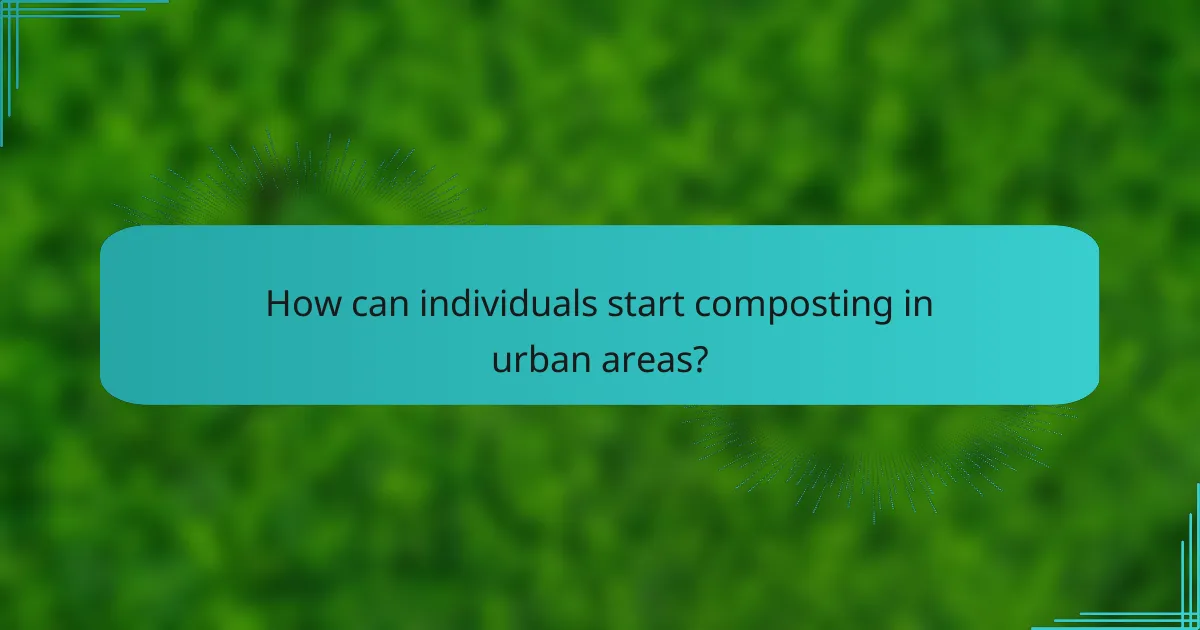
How can individuals start composting in urban areas?
Individuals can start composting in urban areas by selecting an appropriate composting method and using suitable materials. Options include indoor compost bins, worm composting, or outdoor compost piles, depending on space and local regulations.
Waste reduction statistics
Composting significantly reduces the amount of organic waste sent to landfills. In urban settings, it’s estimated that around 30-40% of household waste is compostable, which can lead to substantial reductions in landfill volume and greenhouse gas emissions.
By composting, individuals can divert hundreds of kilograms of waste annually. For example, a family of four might compost approximately 200-300 kg of organic material each year, contributing to a cleaner environment.
Soil quality improvements
Composting enhances soil quality by adding essential nutrients and improving soil structure. The organic matter in compost helps retain moisture, promotes healthy microbial activity, and increases soil aeration.
Urban gardeners can benefit from compost by mixing it into their garden beds or using it as a top dressing. This practice can lead to healthier plants, better yields, and reduced need for chemical fertilizers.
Community involvement
Community composting initiatives can foster local engagement and awareness about waste management. Urban residents can participate in shared composting programs, which often provide resources and education on effective composting practices.
Joining or starting a community composting group can also create social connections and promote sustainability. Many cities offer workshops or incentives for community composting, making it easier for individuals to get involved and make a positive impact.
